Explaining Spiritual Experiences in the Process of Practicing Sharia: A Phenomenological Approach
Keywords:
Sharia, spiritual experience, Islamic spirituality, phenomenology, lived religiosityAbstract
This study aims to explore and explain the spiritual experiences of individuals in the process of practicing Islamic Sharia, using a phenomenological approach. This research adopted a qualitative methodology with a phenomenological orientation. Data were collected through semi-structured interviews with 25 residents of Tehran who had lived experiences related to practicing Sharia. Participants were selected via purposive sampling, and interviews continued until theoretical saturation was achieved. Data were analyzed using Van Manen’s phenomenological method with NVivo software. Findings were categorized into three main themes: (1) Inner Experience of Spirituality (divine presence, spiritual revival, emotional softening, unity experience, inner solace, divine attraction), (2) Transformation in Perception and Meaning (spiritual understanding of religious laws, redefined relationship with God, value shift, sacred time awareness, spiritual self-redefinition, detachment from worldly attachments), and (3) Interpersonal and Social Outcomes (empathy, enhanced family ties, ethical action, social service, reduced interpersonal conflict). Spiritual experiences were often shaped through consistent and repeated religious practices. Spiritual experiences in the process of Sharia practice are not limited to legal or ritualistic dimensions but encompass psychological, cognitive, and social aspects. For participants, Sharia served not as an external obligation but as an internal path to spiritual connection, moral growth, and renewed divine relationship.
Downloads
Downloads
Published
Submitted
Revised
Accepted
Issue
Section
License

This work is licensed under a Creative Commons Attribution-NonCommercial 4.0 International License.


